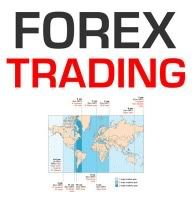The Forex market is a non-stop cash market where currencies of nations are traded, typically via brokers. Foreign currencies are constantly and simultaneously bought and sold across local and global markets and traders’ investments increase or decrease in value based upon currency movements. Foreign exchange market conditions can change at any time in response to real-time events.
The main enticements of currency dealing to private investors and attractions for short-term Forex trading are:
* 24-hour trading, 5 days a week with non-stop access to global Forex dealers.
* An enormous liquid market making it easy to trade most currencies.
* Volatile markets offering profit opportunities.
* Standard instruments for controlling risk exposure.
* The ability to profit in rising or falling markets.
* Leveraged trading with low margin requirements.
* Many options for zero commission trading.
Forex trading
The investor’s goal in Forex trading is to profit from foreign currency movements. Forex trading or currency trading is always done in currency pairs. For example, the exchange rate of EUR/USD on Aug 26th, 2003 was 1.0857. This number is also referred to as a “Forex rate” or just “rate” for short. If the investor had bought 1000 euros on that date, he would have paid 1085.70 U.S. dollars. One year later, the Forex rate was 1.2083, which means that the value of the euro (the numerator of the EUR/USD ratio) increased in relation to the U.S. dollar. The investor could now sell the 1000 euros in order to receive 1208.30 dollars. Therefore, the investor would have USD 122.60 more than what he had started one year earlier. However, to know if the investor made a good investment, one needs to compare this investment option to alternative investments. At the very minimum, the return on investment (ROI) should be compared to the return on a “risk-free” investment. One example of a risk-free investment is long-term U.S. government bonds since there is practically no chance for a default, i.e. the U.S. government going bankrupt or being unable or unwilling to pay its debt obligation.
When trading currencies, trade only when you expect the currency you are buying to increase in value relative to the currency you are selling. If the currency you are buying does increase in value, you must sell back the other currency in order to lock in a profit. An open trade (also called an open position) is a trade in which a trader has bought or sold a particular currency pair and has not yet sold or bought back the equivalent amount to close the position.
However, it is estimated that anywhere from 70%-90% of the FX market is speculative. In other words, the person or institution that bought or sold the currency has no plan to actually take delivery of the currency in the end; rather, they were solely speculating on the movement of that particular currency.
If you don’t have time to trade forex manually or don’t want to trade using with forex robots, then managed accounts are the way to go. If you are interested in having a managed account that is producing good returns, please email me at Mike@WealthSecrets.com and I’ll send you my results of the company that I am using.
3:48 AM
Google - Friend Connect
Forex Tips - Forex Hints, Fx News, Daily Market Analysis
Forex Analyst Commentary
eToro - Your Access to the Forex Market
Worried about the falling markets?
Take advantage of the Forex world with eToro!
eToro - Your Access to the Forex Market









0 Responses to "An Overview of the Forex Market"
Post a Comment